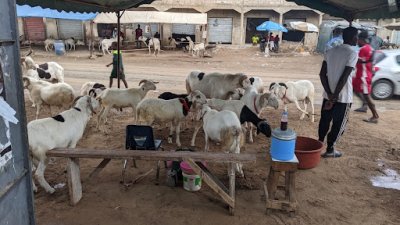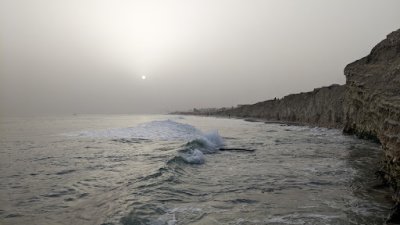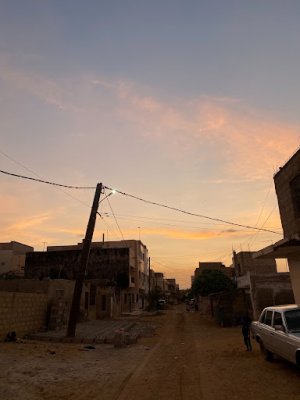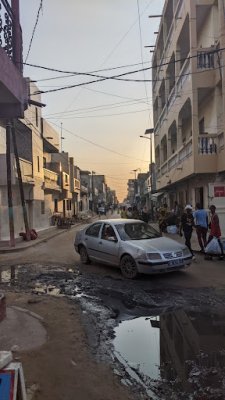Grand Mbao: Association Humanitaire les Amis de l’Ecole
Samuel and Suzanna have been working with an organization called The Humanitarian Association, Friends of the School. This organization supports the public schools with after-school classes and a holiday recreation program. Samuel and Suzanna have been teaching English in the after-school program.
Samuel and I have been placed in Grand Mbao for service. Grand Mbao is a city near Dakar, contained in the sprawl along the highway. It’s unclear where Mbao ends and the next city begins. It’s also right along the beach, so many people fish for their work. Grand Mbao is essentially a suburb of Dakar, but it still feels like it has a village spirit. Much of this little city is composed of dirt roads and everyone seems to know everyone.
One of the biggest challenges in Grand-Mbao is the language barrier. People don’t speak much English here, so we communicate pretty much exclusively in French. This has really stretched our French skills, though we seem to be improving! Consequently, communication requires significant concentration, and it usually takes many repetitions for everyone to be understood. Everyone is very gracious with us. They are especially glad when we throw in a few phrases of Wolof that we know!
Teaching
Each day, Samuel and I teach English for two hours and several additional hours planning our lessons. At first, we thought it would be impossible to come up with 30 lesson plans, as Samuel is a physics major and I am a social work major. Teaching has definitely expanded our knowledge of English. It has been fun to think about what things might be helpful for our students and to come up with a variety of activities.
In the morning, we teach a group of soccer players between the ages of 17 and 27. We have been told that they want to learn English in case they are ever sent abroad to play soccer. The soccer players come with a lot of energy, and it’s been fun joking around with them at the end of class.
In the afternoon, we teach a group of 14 year old girls. They come to us for extra English classes in preparation for an exam they’ll take next July. The girls, too, come with a lot of energy. They like to ask us questions about ourselves and they light up when we talk about the Senegalese foods we like or our Senegalese names.
One girl, in particular, has taken an interest in showing Samuel and I around. She lives very close to the school and is passionate about learning English. One day, she asked Samuel and I if we had tried “mangue verte” before. We both said no, so after class she took us to the market to buy a green mango and salt. Another day, she told us that after class we were going to go with her to watch basketball at the stadium. When we got there, we realized that there was a training camp happening. She called over the coach, and introduced him to us. She introduced us to several other kids who were working out and then we got thrown into the practice.
Tabaski
The other interesting thing happening is that we arrived three weeks before the Tabaski holiday. Tabaski is an important Musim holiday in Senegal that celebrates when God gave a ram to Abraham so he didn’t have to sacrifice Ishmael, his first born. The main point of the celebration is that every household purchases a sheep to slaughter and eat. Because of this, there are sheep everywhere we go. We are continually blown away by the sheer size of some of the sheep. The biggest ones can be almost four feet tall at the shoulder, and look like small cattle out of the corner of your eye. My host dad tells me that they can fetch as much as $800. Tabaski has been a topic that we’ve talked a lot about with our students, and many of them are excited for us to experience our first ever Tabaski!
Host Families
Service has also allowed us to spend time with our new host families.
My (Suzanna) host father is Amadou Seck, and my host mother is Ndeye Ndao. I have four host brothers, three host sisters, and one host niece. One of my favorite times of day is at night, when my dad, mom, and I sit outside in the courtyard. Often, I talk to my dad about politics or culture, and sometimes I give him the English lesson I gave to my students that day. He speaks slowly with me, so it’s a good time for me to practice my French.
I also love watching my mom cook, she always tells me the names of all the ingredients. My dad tells me that, before I leave, I will cook Ceebu Jen for the whole family. I really doubt my ability to cook with only a kerosene stove, but if I’ve learned one thing from both my Senegalese families, it’s that it is important to try. Whether it’s speaking a different language, learning how to wash clothes by hand, or cooking, I’ve received the same message of gratitude for simply trying.
I (Samuel) am hosted by Moussa Samb, his wife, and five children; Mamou-Dhara, twins Bamba and Aita, and the youngest, Muhammad. I don’t actually sleep at the house, I sleep at the school where Suzanna and I teach, which is a three minute walk away. I go over to the house for meals and in my free time. It’s fun to watch TV with the family in the living room, often dubbed American shows and movies including Jack Bauer and The Fast and the Furious. In the evenings I sit in the open air courtyard area with my host dad and we talk about various things, often Senegalese issues that are important to him. Otherwise I enjoy reading in the cooler evening air.
Extra activities (visiting the beach, walking through town)
Since we have lots of free time, we have found a number of ways to occupy ourselves. During the first week, we spent a lot of time walking around town exploring. Mbao stretches for some way between the ocean and the highway to Dakar, so we have walked there and back a couple of times. We also walked across a small river to the area known as Petit-Mbao, along the beach to the northwest towards Dakar.
Suzanna and I both enjoy exercising, so we found a gym to work out at. It’s located a bit incongruently in a residential area off the main road. Though the gym is pretty basic, it’s spacious, clean, and well equipped. There seems to be a significant exercise culture in Senegal, so it’s never empty. People are also super friendly there; one time a personal trainer working for the gym went around handing out cold Senegalese juice to everyone! A nice side benefit is that it also only costs $0.83 for a day pass.
Our favorite thing to do, though, is to go swimming at the beach. We end up doing this about three times a week. The beach is pretty popular here. Many Senegalese go swimming at designated places. We also always see lots of men exercising on the beach. The water is always cool which is very refreshing after a hot day, although we always have to keep our eyes out for fishing boats!
We have also found a cafe/ice cream shop, located across the highway in an area called Zac-Mbao, a short taxi-ride away. The cafe serves ice cream, in large quantities, along with lunch food. Crucially, it also has air conditioning and internet, which we have really grown to appreciate!
In our remaining time, we hope to commandeer both a fishing boat and one of the commonly seen horse carts for a short ride!










